#The Litany of St. Stephen
Explore tagged Tumblr posts
Text
Saints&Reading: Wednesday, 22, May, 2024
may 9_may 22
TRANSLATION OF THE RELICS OF St NICOLAS THE WONDERWORKER FROM MYRA TO BARI ( 1087)

The Transfer of the Relics of Saint Nicholas to Bari in Italy. His Life is found under December 6.
In the eleventh century the Byzantine Empire was going through some terrible times. The Turks put an end to its influence in Asia Minor, they destroyed cities and villages, they murdered the inhabitants, and they accompanied their cruel outrage with the desecration of churches, holy relics, icons and books. The Mussulmen also attempted to destroy the relics of Saint Nicholas, deeply venerated by the whole Christian world.
In the year 792 the caliph Aaron Al’-Rashid sent Khumeid at the head of a fleet to pillage the island of Rhodes. Having lain waste this island, Khumeid set off to Myra in Lycia with the intent to rob the tomb of Saint Nicholas. But instead he robbed another tomb standing alongside the crypt of the saint. Just as they succeeded in committing this sacrilege, a terrible storm lifted upon the sea and almost all the ships were shattered into pieces.
The desecration of holy things shocked not only Eastern, but also Western Christians. Christians in Italy were particularly apprehensive for the relics of Saint Nicholas, and among them were many Greeks. The inhabitants of the city of Bari, located on the shores of the Adriatic Sea, decided to save the relics of Saint Nicholas.
In the year 1087 merchants from Bari and Venice went to Antioch to trade. Both these and others also proposed to take up the relics of Saint Nicholas and transport them to Italy on the return trip. In this plan the men of Bari commissioned the Venetians to land them at Myra. At first two men were sent in, who in returning reported that in the city all was quiet. In the church where the glorified relics rested, they encountered only four monks. Immediately forty-seven men, having armed themselves, set out for the church of Saint Nicholas. The guards, suspecting nothing, showed them the raised platform, beneath which the tomb of the saint was concealed, and where they anointed foreigners with myrrh from the relics of the saint.
At this time the monks told them about an appearance of Saint Nicholas that evening to a certain Elder. In this vision Saint Nicholas ordered the careful preservation of his relics. This account encouraged the barons, they saw an avowal for them in this vision and, as it were, a decree from the saint. In order to facilitate their activity, they revealed their intent to the monks and offered them money, 300 gold coins. The guards refused the money and wanted to warn the inhabitants about the misfortune threatening them. But the newcomers bound them and put their own guards at the doorway.
They took apart the church platform above the tomb with the relics. In this effort the youth Matthew was excessive in his zeal, wanting to find the relics of Saint Nicholas as quickly as possible. In his impatience he broke the cover and the barons saw that the sarcophagus was filled with fragrant holy myrrh. The compatriots of the barons, the priests Luppus and Drogus, offered a litany, after which the break made by Matthew began to flow with myrrh from the saint’s sarcophagus. This occurred on April 20, 1087.
Seeing the absence of a container chest, the priest Drogus wrapped the relics in the cloth, and in the company of the barons he carried them to the ship. The monks, having been set free, alerted the city with the sad news about the abduction of the relics of the Wonderworker Nicholas by foreigners. A crowd of people gathered at the shore, but it was too late.
On May 8 the ships arrived in Bari, and soon the joyous news made the rounds of all the city. On the following day, May 9, 1087, they solemnly transported the relics of Saint Nicholas into the church of Saint Stephen, not far from the sea. The solemn bearing of the relics was accompanied by numerous healings of the sick, which inspired still greater reverence for God’s saint. A year afterwards, a church was built in the name of Saint Nicholas and consecrated by Pope Urban II.
This event, connected with the transfer of the relics of Saint Nicholas, evoked a particular veneration for the Wonderworker Nicholas and was marked by the establishment of a special Feast day on May 9. At first the Feast day of the Transfer of the Relics of Saint Nicholas was observed only by the people of the city of Bari. It was not adopted in the other lands of the Christian East and West, despite the fact that the transfer of the relics was widely known. This circumstance is explained by the custom in the Middle Ages of venerating primarily the relics of local saints. Moreover, the Greek Church did not establish the celebration of this remembrance, since they regarded the loss of the relics of Saint Nicholas as a sad event.
The Russian Orthodox Church celebration of the memory of the Transfer of the Relics of Saint Nicholas from Myra in Lycia to Bari in Italy on May 9 was established soon after the year 1087, on the basis of an already established veneration by the Russian people of the great saint of God, brought from Greece simultaneously with the acceptance of Christianity. The glorious accounts of the miracles performed by the saint on both land and sea, were widely known to the Russian people. Their boundless power and abundance testify to the help of the great saint of God for suffering mankind. The image of Saint Nicholas, a mighty wonderworker and benefactor, became especially dear to the heart of the Russian people, since it inspired deep faith and hope for his intercession. The faith of the Russian people in the abundant aid of God’s saint was marked by numerous miracles.

A significant body of literature was compiled about him very early in Russian writings. Accounts of the miracles of Saint Nicholas done in the Russian land were recorded at an early date. Soon after the Transfer of the Relics of Saint Nicholas from Myra to Bari, a Russian version of his Life and an account of the Transfer of his holy relics were written by a contemporary to this event. Earlier still, an encomium to the Wonderworker was written. Each week on Thursday, the Russian Orthodox Church honors his memory in particular.
Numerous churches and monasteries were built in honor of Saint Nicholas, and Russian people are wont to name their children after him at Baptism. In Russia are preserved numerous wonderworking icons of the saint. Most renowned among them are the icons of Mozhaisk, Zaraisk, Volokolamsk, Ugreshsk and Ratny. There was no house or temple in the Russian land in which there was not an icon of Saint Nicholas the Wonderworker.
The significance of the intercession of the great saint of God is expressed by the ancient compiler of the Life, in the words of whom Saint Nicholas “did work many glorious miracles both on land and on sea, aiding those downtrodden in misfortune and rescuing the drowning, carrying to dry land from the depths of the sea, raising up others from corruption and bringing them home, liberating from chains and imprisonment, averting felling by the sword and freeing from death, and granting healing to many; sight to the blind, walking to the lame, hearing to the deaf, and speech to the mute. He brought riches to many suffering in abject poverty and want, he provided the hungry food, and for each in their need he appeared a ready helper, an avid defender and speedy intercessor and protector, and such as appeal to him he doth help and deliver from adversity. Both the East and the West know of this great Wonderworker, and all the ends of the earth know his miracle-working.”
THE HOLY PROPHET ISAIAH (8th.c.)

Icon: Uncut Mountian Supply
The Holy Prophet Isaiah lived 700 years before the birth of Christ, and was of royal lineage. Isaiah’s father Amos raised his son in the fear of God and in the law of the Lord. Having attained the age of maturity, the Prophet Isaiah entered into marriage with a pious prophetess (Is 8:3) and had a son Jashub (Is 8:18).
Saint Isaiah was called to prophetic service during the reign of Oziah [Uzziah], king of Judea, and he prophesied for 60 years during the reign of kings Joatham, Achaz [Ahaz], Hezekiah and Manasseh. The start of his service was marked by the following vision: he beheld the Lord God, sitting in a majestic heavenly temple upon a high throne. Six-winged Seraphim encircled Him. With two wings they covered their faces, and with two wings they covered their feet, and with two wings they flew about crying out one to another, “Holy, Holy, Holy Lord Sabaoth, heaven and earth are filled with His glory!” The pillars of the heavenly temple shook from their shouts, and in the temple arose the smoke of incense.
The prophet cried out in terror, “Oh, an accursed man am I, granted to behold the Lord Sabaoth, and having impure lips and living amidst an impure people!” Then was sent him one of the Seraphim, having in hand a red-hot coal, which he took with tongs from the altar of the Lord. He touched it to the mouth of the Prophet Isaiah and said, “Lo, this has touched thy lips, and will take away with thine iniquities, and will cleanse thy sins.” After this Isaiah heard the voice of the Lord, directed towards him, “Whom shall I send, and who will go to this people?” Isaiah answered, “Here am I, send me” (Is 6:1 ff). And the Lord sent him to the Jews to exhort them to turn from the ways of impiety and idol worship, and to offer repentance.
To those that repent and turn to the true God, the Lord promised mercy and forgiveness, but punishment and the judgment of God are appointed for the unrepentant. Then Isaiah asked the Lord, how long would the falling away of the Jewish nation from God continue. The Lord answered, “Until the cities be deserted, by reason of there being no people, and the land shall be made desolate. Just as when a tree be felled and from the stump come forth new shoots, so also from the destruction of the nation a holy remnant will remain, from which will emerge a new tribe.”
Isaiah left behind him a book of prophecy in which he denounces the Jews for their unfaithfulness to the God of their Fathers. He predicted the captivity of the Jews and their return from captivity during the time of the emperor Cyrus, the destruction and renewal of Jerusalem and of the Temple. Together with this he predicts the historical fate also of the other nations bordering the Jews. But what is most important of all for us, the Prophet Isaiah with particular clarity and detail prophesies about the coming of the Messiah, Christ the Savior. The prophet names the Messiah as God and Man, teacher of all the nations, founder of the Kingdom of peace and love.
The prophet foretells the birth of the Messiah from a Virgin, and with particular clarity he describes the Suffering of the Messiah for the sins of the world. He foresees His Resurrection and the universal spreading of His Church. By his clear foretelling of Christ the Savior, the Prophet Isaiah deserves to be called an Old Testament Evangelist. To him belong the words, “He beareth our sins and is smitten for us.... He was wounded for our sins and tortured for our transgressions. The chastisement of our world was upon Him, and by His wounds we were healed....” (Is 53:4-5. Vide Isaiah: 7:14, 11:1, 9:6, 53:4, 60:13, etc.).
The holy Prophet Isaiah had also a gift of wonderworking. And so, when during the time of a siege of Jerusalem by enemies the besieged had become exhausted with thirst, he by his prayer drew out from beneath Mount Sion a spring of water, which was called Siloam, i.e. “sent from God.” It was to this spring afterwards that the Savior sent the man blind from birth to wash, and He restored his sight. By the prayer of the Prophet Isaiah, the Lord prolonged the life of Hezekiah for 15 years.
The Prophet Isaiah died a martyr’s death. By order of the Jewish king Manasseh he was sawn through by a wood-saw. The prophet was buried not far from the Pool of Siloam. The relics of the holy Prophet Isaiah were afterwards transferred by the emperor Theodosius the Younger to Constantinople and installed in the church of Saint Laurence at Blachernae. At the present time part of the head of the Prophet Isaiah is preserved at Athos in the Hilandar monastery.
For the times and the events which occurred during the life of the Prophet Isaiah, see the 4th Book of Kings [alt. 2 Kings] (Ch 16, 17, 19, 20, 23, etc.), and likewise 2 Chr 26-32.


ACTS 8:18-25
18 And when Simon saw that through the laying on of the apostles' hands the Holy Spirit was given, he offered them money, 19 saying, "Give me this power also, that anyone on whom I lay hands may receive the Holy Spirit." 20 But Peter said to him, "Your money perish with you, because you thought that the gift of God could be purchased with money! 21 You have neither part nor portion in this matter, for your heart is not right in the sight of God. 22 Repent therefore of this your wickedness, and pray God if perhaps the thought of your heart may be forgiven you. 23 For I see that you are poisoned by bitterness and bound by iniquity. 24 Then Simon answered and said, "Pray to the Lord for me, that none of the things which you have spoken may come upon me." 25 So when they had testified and preached the word of the Lord, they returned to Jerusalem, preaching the gospel in many villages of the Samaritans.
LUKE 6:17-23
17 And He came down with them and stood on a level place with a crowd of His disciples and a great multitude of people from all Judea and Jerusalem, and from the seacoast of Tyre and Sidon, who came to hear Him and be healed of their diseases, 18 as well as those who were tormented with unclean spirits. And they were healed. 19 And the whole multitude sought to touch Him, for power went out from Him and healed them all. 20 Then He lifted up His eyes toward His disciples, and said: Blessed are you poor, For yours is the kingdom of God. 21 Blessed are you who hunger now, For you shall be filled. Blessed are you who weep now, For you shall laugh. 22 Blessed are you when men hate you, And when they exclude you, And revile you, and cast out your name as evil, For the Son of Man's sake. 23 Rejoice in that day and leap for joy! For indeed your reward is great in heaven, For in like manner their fathers did to the prophets.
#orthodoxy#orthodoxchristianity#easternorthodoxchurch#originofchristianity#spirituality#holyscriptures#gospel#bible#wisdom#faith#saints
1 note
·
View note
Text
Power of the Saints
THE LITANY OF THE SAINTS
Catechism of the Catholic Church 2683:
𝙏𝙝𝙚 𝙬𝙞𝙩𝙣𝙚𝙨𝙨𝙚𝙨 𝙬𝙝𝙤 𝙝𝙖𝙫𝙚 𝙥𝙧𝙚𝙘𝙚𝙙𝙚𝙙 𝙪𝙨 𝙞𝙣𝙩𝙤 𝙩𝙝𝙚 𝙠𝙞𝙣𝙜𝙙𝙤𝙢, 𝙚𝙨𝙥𝙚𝙘𝙞𝙖𝙡𝙡𝙮 𝙩𝙝𝙤𝙨𝙚 𝙬𝙝𝙤𝙢 𝙩𝙝𝙚 𝘾𝙝𝙪𝙧𝙘𝙝 𝙧𝙚𝙘𝙤𝙜𝙣𝙞𝙯𝙚𝙨 𝙖𝙨 𝙨𝙖𝙞𝙣𝙩𝙨, 𝙨𝙝𝙖𝙧𝙚 𝙞𝙣 𝙩𝙝𝙚 𝙡𝙞𝙫𝙞𝙣𝙜 𝙩𝙧𝙖𝙙𝙞𝙩𝙞𝙤𝙣 𝙤𝙛 𝙥𝙧𝙖𝙮𝙚𝙧 𝙗𝙮 𝙩𝙝𝙚 𝙚𝙭𝙖𝙢𝙥𝙡𝙚 𝙤𝙛 𝙩𝙝𝙚𝙞𝙧 𝙡𝙞𝙫𝙚𝙨, 𝙩𝙝𝙚 𝙩𝙧𝙖𝙣𝙨𝙢𝙞𝙨𝙨𝙞𝙤𝙣 𝙤𝙛 𝙩𝙝𝙚𝙞𝙧 𝙬𝙧𝙞𝙩𝙞𝙣𝙜𝙨, 𝙖𝙣𝙙 𝙩𝙝𝙚𝙞𝙧 𝙥𝙧𝙖𝙮𝙚𝙧 𝙩𝙤𝙙𝙖𝙮. 𝙏𝙝𝙚𝙮 𝙘𝙤𝙣𝙩𝙚𝙢𝙥𝙡𝙖𝙩𝙚 𝙂𝙤𝙙, 𝙥𝙧𝙖𝙞𝙨𝙚 𝙝𝙞𝙢 𝙖𝙣𝙙 𝙘𝙤𝙣𝙨𝙩𝙖𝙣𝙩𝙡𝙮 𝙘𝙖𝙧𝙚 𝙛𝙤𝙧 𝙩𝙝𝙤𝙨𝙚 𝙬𝙝𝙤𝙢 𝙩𝙝𝙚𝙮 𝙝𝙖𝙫𝙚 𝙡𝙚𝙛𝙩 𝙤𝙣 𝙚𝙖𝙧𝙩𝙝. 𝙒𝙝𝙚𝙣 𝙩𝙝𝙚𝙮 𝙚𝙣𝙩𝙚𝙧𝙚𝙙 𝙞𝙣𝙩𝙤 𝙩𝙝𝙚 𝙟𝙤𝙮 𝙤𝙛 𝙩𝙝𝙚𝙞𝙧 𝙈𝙖𝙨𝙩𝙚𝙧, 𝙩𝙝𝙚𝙮 𝙬𝙚𝙧𝙚 "𝙥𝙪𝙩 𝙞𝙣 𝙘𝙝𝙖𝙧𝙜𝙚 𝙤𝙛 𝙢𝙖𝙣𝙮 𝙩𝙝𝙞𝙣𝙜𝙨." 𝙏𝙝𝙚𝙞𝙧 𝙞𝙣𝙩𝙚𝙧𝙘𝙚𝙨𝙨𝙞𝙤𝙣 𝙞𝙨 𝙩𝙝𝙚𝙞𝙧 𝙢𝙤𝙨𝙩 𝙚𝙭𝙖𝙡𝙩𝙚𝙙 𝙨𝙚𝙧𝙫𝙞𝙘𝙚 𝙩𝙤 𝙂𝙤𝙙'𝙨 𝙥𝙡𝙖𝙣. 𝙒𝙚 𝙘𝙖𝙣 𝙖𝙣𝙙 𝙨𝙝𝙤𝙪𝙡𝙙 ��𝙨𝙠 𝙩𝙝𝙚𝙢 𝙩𝙤 𝙞𝙣𝙩𝙚𝙧𝙘𝙚𝙙𝙚 𝙛𝙤𝙧 𝙪𝙨 𝙖𝙣𝙙 𝙛𝙤𝙧 𝙩𝙝𝙚 𝙬𝙝𝙤𝙡𝙚 𝙬𝙤𝙧𝙡𝙙.
We are surrounded by a great cloud of witnesses (Hebrews 12:1) who are in heaven praising God and eager to pray for you. All you need to do is ask them to pray on your behalf. Pray, therefore, the Litany of Saints to benefit from their intercession for your physical and spiritual protection.
LITANY OF THE SAINTS
(4-min to pray)
P: Lord, have mercy.
All: Lord, have mercy.
P: Christ, have mercy.
All: Christ, have mercy.
P: Lord, have mercy.
All: Lord, have mercy.
P: Christ, hear us.
All: Christ, graciously hear us.
P: God, the Father in heaven.
All: Have mercy on us.
P: God, the Son, Redeemer of the world.
All: Have mercy on us.
P: God, the Holy Spirit.
All: Have mercy on us.
P: Holy Trinity, one God.
All: Have mercy on us.
Holy Mary, pray for us, (After each invocation: "Pray for us.")
Holy Mother of God,
Holy Virgin of virgins,
St. Michael,
St. Gabriel,
St. Raphael,
All holy angels and archangels,
All holy orders of blessed spirits,
St. John the Baptist,
St. Joseph,
All holy patriarchs and prophets,
St. Peter,
St. Paul,
St. Andrew,
St. James,
St. John,
St. Thomas,
St. James,
St. Philip,
St. Bartholomew,
St. Matthew,
St. Simon,
St. Thaddeus,
St. Matthias,
St. Barnabas,
St. Luke,
St. Mark,
All holy apostles and evangelists,
All holy disciples of the Lord,
St. Stephen,
St. Lawrence,
St. Vincent,
SS. Fabian and Sebastian,
SS. John and Paul,
SS. Cosmas and Damian,
SS. Gervase and Protase,
All holy martyrs,
All holy Innocents,
St. Sylvester,
St. Gregory,
St. Ambrose,
St. Augustine,
St. Jerome,
St. Martin,
St. Nicholas,
All holy bishops and confessors,
All holy doctors,
St. Anthony,
St. Benedict,
St. Bernard,
St. Dominic,
St. Francis,
All holy priests and Levites,
All holy monks and hermits,
St. Mary Magdalen,
St. Agatha,
St. Lucy,
St. Agnes,
St. Cecilia,
St. Catherine,
St. Anastasia,
All holy virgins and widows,
P: All holy saints of God,
All: Intercede for us.
P: Be merciful,
All: Spare us, O Lord.
P: Be merciful,
All: Graciously hear us, O Lord.
From all evil, deliver us, O Lord. (After each invocation: "Deliver us, O Lord.")
From all sin,
From your wrath,
From sudden and unprovided death,
From the snares of the devil,
From anger, hatred, and all ill will,
From all lewdness,
From lightning and tempest,
From the scourge of earthquakes,
From plague, famine, and war,
From everlasting death,
By the mystery of your holy incarnation,
By your coming,
By your birth,
By your baptism and holy fasting,
By your cross and passion,
By your death and burial,
By your holy resurrection,
By your wondrous ascension,
By the coming of the Holy Spirit, the Advocate,
On the day of judgment,
P: We sinners,
All: We beg you to hear us.
That you spare us, (After each invocation: "We beg you to hear us.")
That you pardon us,
That you bring us to true penance,
That you govern and preserve your holy Church,
That you preserve our Holy Father and all ranks in the Church in holy religion,
That you humble the enemies of holy Church,
That you give peace and true concord to all Christian rulers,
That you give peace and unity to the whole Christian world,
That you restore to the unity of the Church all who have strayed from the truth, and lead all unbelievers to the light of the Gospel,
That you confirm and preserve us in your holy service,
That you lift up our minds to heavenly desires,
That you grant everlasting blessings to all our benefactors,
That you deliver our souls and the souls of our brethren, relatives, and benefactors from everlasting damnation,
That you give and preserve the fruits of the earth,
That you grant eternal rest to all the faithful departed,
That you graciously hear us,
P: Lamb of God, who take away the sins of the world,
All: Spare us, O Lord.
P: Lamb of God, who take away the sins of the world,
All: Graciously hear us, O Lord.
P: Lamb of God, who take away the sins of the world,
All: Have mercy on us.
P: Christ, hear us.
All: Christ, graciously hear us.
P: Lord, have mercy.
All: Christ, have mercy.
P: Lord, have mercy.
Our Father …
P: And lead us not into temptation.
All: But deliver us from evil.
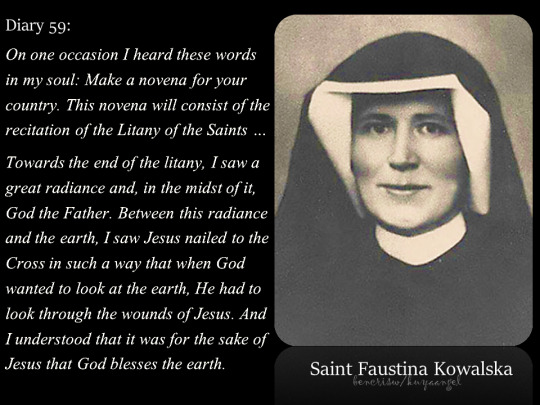
1 note
·
View note
Text
Sébastien Michaëlis - Wikipedia
Sébastien Michaelis was a French inquisitor and prior of the Dominican order who lived during the late 16th and early 17th centuries. His Histoire admirable de la possession et conversion d'une penitente (1612) includes a classification of demons which has passed into general use in esoteric literature.
Michaëlis's classification
edit
In 1613 the Dominican prior and French inquisitor, Sébastien Michaëlis wrote a book, Admirable History, which included a classification of demons as it was told to him by the demon Berith when he was exorcising a nun, according to the author.[a] This classification is based on the Pseudo-Dionysian hierarchies, according to the sins the devil tempts one to commit, and includes the demons' adversaries (who suffered that temptation without falling).[18][21]
First hierarchy
edit
The first hierarchy includes angels that were Seraphim, Cherubim, and Thrones:[18]
Beelzebub was a prince of the Seraphim, just below Lucifer. Beelzebub, along with Lucifer and Leviathan, were the first three angels to fall. He tempts men with pride and is opposed by St. Francis.
Leviathan was also a prince of the Seraphim who tempts people to give into heresy, and is opposed by St. Peter.
Asmodeus was also a prince of the Seraphim, burning with desire to tempt men into wantonness. He is opposed by St. John the Baptist.
Berith was a prince of the Cherubim. He tempts men to commit homicide, and to be quarrelsome, contentious, and blasphemous. He is opposed by St. Barnabas.
Astaroth was a prince of Thrones, who tempts men to be lazy and is opposed by St. Bartholomew.
Verrine was also a prince of Thrones, just below Astaroth. He tempts men with impatience and is opposed by St. Dominic.
Gressil was the third prince of Thrones, who tempts men with impurity and is opposed by St. Bernard.
Soneillon was the fourth prince of Thrones, who tempts men to hate and is opposed by St. Stephen.
Second hierarchy
edit
The second hierarchy includes Powers, Dominions, and Virtues:[18]
Carreau was a prince of Powers. He tempts men with hardness of heart and is opposed by St. Vincent.
Carnivale was also a prince of Powers. He tempts men to obscenity and shamelessness, and is opposed by John the Evangelist.
Oeillet was a prince of Dominions. He tempts men to break the vow of poverty and is opposed by St. Martin.
Rosier was the second in the order of Dominions. He tempts men against sexual purity and is opposed by St. Basil.
Belias was the prince of Virtues. He tempts men with arrogance and women to be vain, raise wanton children, and gossip during mass. He is opposed by St. Francis de Paul.
Third hierarchy
edit
The third hierarchy Principalities, Archangels, and Angels:[18]
Verrier was the prince of Principalities. He tempts men against the vow of obedience and is opposed by St. Bernard.
Olivier was the prince of the Archangels. He tempts men with cruelty and mercilessness toward the poor and is opposed by St. Lawrence, patron saint of the poor.[22]
Iuvart was the prince of Angels. At the time of Michaelis's writing, Iuvart was believed to have possessed a young novice nun of the Ursulines, Madeleine Demandols de La Palud, from whom it was exorcised.[23]
Many of the names and ranks of these demons appear in the Sabbath litanies of witches, according to Jules Garinet's Histoire de la magie en France, and Collin de Plancy's Dictionnaire Infernal.
Gervais is a PETIT CHAMPLAIN MEMBER of Michaëlis Classification; Sin is Hersey and brings Distorted Sensory Play and Drug Sorcery.
Petit Champlain Baby Satans
0 notes
Text
December 26 is the feast day of St. Stephen, First Martyr

Source of picture: https://catholicharboroffaithandmorals.com
The Litany of St. Stephen
(For private recitation only)
Lord, have mercy on us
Christ, have mercy on us
Lord, have mercy on us,
Christ, hear us,
Christ, graciously hear us.
God, the Father of heaven, have mercy on us.
God, the Son, Redeemer of the world, have mercy on us.
God, the Holy Ghost, have mercy on us.
St. Stephen, first martyr,
pray for us. *
St. Stephen, who suffered for preaching the name of Jesus Christ,*
St. Stephen, who so closely imitated Jesus Christ in that great virtue of charity for your enemies,*
St. Stephen, who, when stoned by your enemies, cast forth sparks, not of anger, but of love, to set on fire their hearts, harder than the stones which they threw,*
St. Stephen, having recommended your own soul to God, cried for your enemies, Pardon them, O Lord, and punish them not for their sins,*
St. Stephen, most zealous for the glory of God,*
St. Stephen, most patient and constant,*
St. Stephen, pattern of chastity and purity,*
St. Stephen, whose heavenly fortitude caused admiration in all,*
St. Stephen, by whom so many miracles were wrought,*
St. Stephen, who, in the love of God, was not inferior to the Apostles themselves,*
St. Stephen, who converted many to the faith of Christ,*
St. Stephen, by whom the Church has received and does continually receive such singular benefits,*
St. Stephen, of whom it is said, that the Holy Ghost, Who inhabited your soul, shone and darted forth his rays into your body,*
St. Stephen, whose face shone like that of an angel,*
St. Stephen, an angel in chastity,*
St. Stephen, full of faith and of the Holy Ghost,*
St. Stephen, dear to the heart of Jesus,*
Let us pray:
O glorious saint, faithful imitator of Jesus Christ martyr in will and in reality, so full of charity, zeal, love, and purity, deign to intercede for us poor exiles; you who are so high in the favor of God, we do entreat you to procure for us a little spark of that divine love which animated your heart, that we too one day may have the happiness of seeing our God face to face.
Oh! obtain for us that virtue for which you were so eminent, and which in our holy vocation is particularly required--Charity. Amen.
Source: https://catholicharboroffaithandmorals.com
#St. Stephen#saints#prayer#The Litany of St. Stephen#First Martyr#martyr#Lord#have mercy on us#glorious saint#faithful imitator of Jesus Christ#let us pray#pray for us#God#Jesus#Christ#Jesus Christ#Father#Son#Holy Spirit#Holy Trinity#christian religion#faith#hope#love#stress reliever
10 notes
·
View notes
Quote
The only time this passage [Matt. 23:35, where Jesus refers to Abel] is used liturgically is the Gospel for the feast of St. Stephen. Abel is thus made the Old Testament equivalent of the Protomartyr, and, as we have seen, the Irish Litany of Confession actually calls him "first martyr" [cet-mairtír]. The whole conception of martyrdom, so fundamental for the constitution of the Church and for her devotional and liturgical life, is here referred to the contemplation of the fact that the first human being to die was murdered because of his election by God.
John Hennig (“Abel's Place in the Liturgy”)
50 notes
·
View notes
Text

Ember Days: The 1st Wednesday, Friday & Saturday after ‘Lucy, Ashes, Dove and Cross’
The term ‘Ember Days‘ find its origin in the Latin Quatuor Tempora (‘four times’). Ember Days are observed on the successive Wednesday, Friday and Saturday at the beginning of the four seasons of the year and are an ancient practise instituted by the Church to thank God for blessings received and to implore further graces for the season ahead. They are intended to thank God for the gifts of nature, to teach men to make use of them in moderation and to assist those in need.
Ember Days are days of fasting and abstinence and fall annually after “Lucy, Ashes, Dove, and Cross“:
• December 13 (St. Lucia, V.M.) • Ash Wednesday • Whitsunday (Pentecost) • September 14 (Exaltation of the Holy Cross)
From Blessed be God: A Complete Catholic Prayer Book (pp.234-5): “Wednesday, Friday and Saturday were days of particular devotion in the early Church: Wednesday as recalling the betrayal of our Lord, and Friday in memory of His Passion, Saturday was later added to these days of prayer and penance as a continuation of Friday, and as far back as the second century they were set apart as Stational days, that is, as days of special religious service and fasting.”
The origins of Ember Days date from the ancient Church (at least the fifth century) and the modern format was arranged and prescribed by Pope Gregory VII (1073-1085).
As the dismantling, deconstruction and open disregard for the practise of the authentic, orthodox Catholic Faith took hold after Vatican II, veiled in stratagems of ambiguity and seeded generationally, the observance of Ember and Rogation Days were among the early casualties.
And on that note, and bearing in mind that God sends His people the priests that they deserve – some say on a personal, rather than purely societal, basis – following the extract from Jeremiah 3: 14-15 below, are some prayers for Ember Days.
“Return, O ye revolting children, saith the Lord: for I am your husband: and I will take you, one of a city, and two of a kindred, … I will give you pastors according to my own heart, and they shall feed you with knowledge and doctrine.” (Jeremiah 3: 14-15)
Ember Day Prayers
ANT. Bless the Lord, O my soul, and never forget all He hath done for thee.
V/. Lord, Thou hast been our refuge. R/. From generation to generation.
Let us pray. GRANT, we beseech Thee, almighty God, that as year by year we devoutly keep these holy observances, we may be pleasing to Thee both in body and soul. Through Christ our Lord. Amen.
In Honour of Christ’s Betrayal and Passion
O GOD, Who to redeem the world didst vouchsafe to be born amongst men, to be circumcised, rejected by the Jews, betrayed by the traitor Judas with a kiss, to be bound with cords, and as an innocent lamb to be led to the slaughter; Who didst suffer Thyself to be shamelessly exposed to the gaze of Annas, Caiphus, Pilate and Herod; to be accused by false witnesses, tormented by scourges and insults, crowned with thorns, smitten with blows, defiled with spittings, to have Thy divine countenance covered, to be struck with a reed, to be stripped of Thy clothes, nailed to and raised high upon a Cross between two thieves, to be given gall and vinegar to drink, and then pierced with a lance; do Thou, O LORD, by these most sacred sufferings, which I, unworthy as I am, yet dare to contemplate, by Thy holy Cross and by Thy bitter Death, free me from the pains of hell, and vouchsafe to bring me to Paradise, whither Thou didst lead the thief who was crucified with Thee, my Jesus, Who with the Father and the Holy Ghost livest and reignest, God forever and ever. Amen.
5x Pater Noster … Ave Maria … Gloria Patri … (Pre-1968 Indulgence of 3 years)
Prayer for God’s Blessing on Our Labours
O LORD, graciously look down upon Thy servants and upon the work of their hands, and do Thou, Who givest food to every creature, bless and preserve the fruits of the earth, that the needy may be filled with good things and that all may praise the glory of Thy bounty. Through Christ our Lord. Amen.
For Vocations to the Priesthood
ANT. Why stand ye all the day idle, go ye into my vineyard.
V/. Ask the Lord of the harvest. R/. That He send labourers into His vineyard.
Let us pray. GOD, Who willest not the death of the sinner, but rather that he should be converted and live; grant, by the intercession of blessed Mary Ever-Virgin and of all the saints, labourers for Thy Church, fellow labourers with Christ, to spend and consume themselves for souls. Through the same Jesus Christ, our Lord, Who livest and reignest with Thee in the unity of the Holy Ghost, God, world without end. (Pre-1968 Indulgence of 3 years)
•••••••
Psalm 102
Benedic, anima. Thanksgiving to God for His mercies. [1] FOR DAVID himself.
Bless the Lord, O my soul: and let all that is within me bless his holy name. [2] Bless the Lord, O my soul, and never forget all he hath done for thee. [3] Who forgiveth all thy iniquities: who healeth all thy diseases. [4] Who redeemeth thy life from destruction: who crowneth thee with mercy and compassion. [5] Who satisfieth thy desire with good things: thy youth shall be renewed like the eagle’s.
.[6] The Lord doth mercies, and judgment for all that suffer wrong. [7] He hath made his ways known to Moses: his wills to the children of Israel. [8] The Lord is compassionate and merciful: longsuffering and plenteous in mercy. [9] He will not always be angry: nor will he threaten for ever. [10] He hath not dealt with us according to our sins: nor rewarded us according to our iniquities.
.[11] For according to the height of the heaven above the earth: he hath strengthened his mercy towards them that fear him. [12] As far as the east is from the west, so far hath he removed our iniquities from us. [13] As a father hath compassion on his children, so hath the Lord compassion on them that fear him: [14] For he knoweth our frame. He remembereth that we are dust: [15] Man’s days are as grass, as the flower of the field so shall he flourish.
.[16] For the spirit shall pass in him, and he shall not be: and he shall know his place no more. [17] But the mercy of the Lord is from eternity and unto eternity upon them that fear him: And his justice unto children’s children, [18] To such as keep his covenant, And are mindful of his commandments to do them. [19] The Lord hath prepared his throne in heaven: and his kingdom shall rule over all. [20] Bless the Lord, all ye his angels: you that are mighty in strength, and execute his word, hearkening to the voice of his orders.
.[21] Bless the Lord, all ye his hosts: you ministers of his that do his will. [22] Bless the Lord, all his works: in every place of his dominion, O my soul, bless thou the Lord.
Gloria Patri …
•••••••
Litany of the Saints
Lord, have mercy on us. (Lord have mercy on us.) Christ, have mercy on us. (Christ have mercy on us.) Lord, have mercy on us. (Lord, have mercy on us.)
Christ, hear us. (Christ, hear us.) Christ, graciously hear us. (Christ, graciously hear us.)
God the Father of heaven, (have mercy on us.) God the Son, Redeemer of the world, (have mercy on us.) God the Holy Ghost, (have mercy on us.) Holy Trinity, one God, (have mercy on us.)
Holy Mary, (* pray for us) Holy Mother of God, (*) Holy Virgin of virgins, (*)
St. Michael, (*) St. Gabriel, (*) St. Raphael, (*) All ye holy Angels and Archangels, (*) All ye holy orders of blessed Spirits, (*)
St. John the Baptist, (*) St. Joseph, (*) All ye holy Patriarchs and Prophets, (*)
St. Peter, (*) St. Paul, (*) St. Andrew, (*) St. James, (*) St. John, (*) St. Thomas, (*) St. James, (*) St. Philip, (*) St. Bartholomew, (*) St. Matthew, (*) St. Simon, (*) St. Thaddeus, (*) St. Matthias, (*) St. Barnabas, (*) St. Luke, (*) St. Mark, (*) All ye holy Apostles and Evangelists, (*) All ye holy Disciples of the Lord, (*)
All ye holy Innocents, (*) St. Stephen, (*) St. Lawrence, (*) St. Vincent, (*) SS. Fabian and Sebastian, (*) SS. John and Paul, (*) SS. Cosmas and Damian, (*) SS. Gervase and Protase, (*) All ye holy Martyrs, (*)
St. Sylvester, (*) St. Gregory, (*) St. Ambrose, (*) St. Augustine, (*) St. Jerome, (*) St. Martin, (*) St. Nicholas, (*) All ye holy Bishops and Confessors, (*) All ye holy Doctors, (*)
St. Anthony, (*) St. Benedict, (*) St. Bernard, (*) St. Dominic, (*) St. Francis, (*) All ye holy Priests and Levites, (*) All ye holy Monks and Hermits, (*)
St. Mary Magdalen, (*) St. Agatha, (*) St. Lucy, (*) St. Agnes, (*) St. Cecilia, (*) St. Catherine, (*) St. Anastasia, (*) All ye holy Virgins and Widows, (*) [Other Saints may be added]
All ye holy Saints of God, (Make intercession for us.) Be merciful, (Spare us, O Lord.) Be merciful, (Graciously hear us, O Lord.)
From all evil, (^ O Lord, deliver us) From all sin, (^) From Thy wrath, (^) From sudden and unlooked for death, (^) From the snares of the devil, (^) From anger, and hatred, and every evil will, (^) From the spirit of fornication, (^) From lightning and tempest, (^) From the scourge of earthquakes, (^) From plague, famine and war, (^) From everlasting death, (^) Through the mystery of Thy holy Incarnation, (^) Through Thy Coming, (^) Through Thy Birth, (^) Through Thy Baptism and holy Fasting, (^) Through Thy Cross and Passion, (^) Through Thy Death and Burial, (^) Through Thy holy Resurrection, (^) Through Thine admirable Ascension, (^) Through the coming of the Holy Ghost, the Paraclete. (^) In the day of judgment. (^)
We sinners, (~ we beseech Thee, hear us) That Thou wouldst spare us, (~) That Thou wouldst pardon us, (~) That Thou wouldst bring us to true penance, (~) That Thou wouldst vouchsafe to govern and preserve Thy holy Church, (~) That Thou wouldst vouchsafe to preserve our Apostolic Prelate, and all orders of the Church in holy religion, (~) That Thou wouldst vouchsafe to humble the enemies of holy Church, (~) That Thou wouldst vouchsafe to give peace and true concord to Christian kings and princes, (~) That Thou wouldst vouchsafe to grant peace and unity to the whole Christian world, (~) That Thou wouldst call back to the unity of the Church all who have strayed from her fold, and to guide all unbelievers into the light of the Gospel, (~) That Thou wouldst vouchsafe to confirm and preserve us in Thy holy service, (~) That Thou wouldst lift up our minds to heavenly desires, (~) That Thou wouldst render eternal blessings to all our benefactors, (~) That Thou wouldst deliver our souls, and the souls of our brethren, relations, and benefactors, from eternal damnation, (~) That Thou wouldst vouchsafe to give and preserve the fruits of the earth, (~) That Thou wouldst vouchsafe to grant eternal rest to all the faithful departed, (~) That Thou wouldst vouchsafe graciously to hear us, (~) Son of God, (~)
Lamb of God, who taketh away the sins of the world, (spare us, O Lord.) Lamb of God, who taketh away the sins of the world, (graciously hear us, O Lord.) Lamb of God, who taketh away the sins of the world, (have mercy on us.)
Christ, (hear us.) Christ, (graciously hear us.) Lord, have mercy, (Lord, have mercy.) Christ, have mercy, (Christ, have mercy.) Lord, have mercy, (Lord, have mercy.) . [Our Father, inaudibly until] … And lead us not into temptation (but deliver us from evil. Amen.)
(Partial Indulgence, 1968; taken from Fisheaters.com)
~~~ +++++++ ~~~ Rogation Day Prayer
All we can do is worth nothing Unless God blesses the deed; Vainly we hope for the harvest-tide Till God gives life to the seed; Yet nearer and nearer draws the time, The time that shall surely be When the earth shall be filled with the glory of God As the waters cover the sea.
(source)
5 notes
·
View notes
Text
Today, the Church remembers Theodore of Tarsus (602– 19 September 690 AD) was the Archbishop of Canterbury from 668 to 690 AD, and is best known for his reform of the English Church and establishment of a school in Canterbury.
Ora pro nobis.
Theodore's life can be divided into the time before his arrival in Britain as Archbishop of Canterbury, and his archiepiscopate. Until recently, scholarship on Theodore had focused on only the latter period since it is attested in Bede's Ecclesiastical History of the English, and also in Stephen of Ripon's Vita Sancti Wilfrithi, whereas no source directly mentions Theodore's earlier activities.
Theodore was of Byzantine Greek descent, born in Tarsus in Cilicia, a Greek-speaking diocese of the Byzantine Empire. Theodore's childhood saw devastating wars between Byzantium and the Persian Sassanid Empire, which resulted in the capture of Antioch, Damascus, and Jerusalem in 613-614 AD. Persian forces captured Tarsus when Theodore was 11 or 12 years old, and evidence exists that Theodore had experience of Persian culture. It is most likely that he studied at Antioch, the historic home of a distinctive school of exegesis, of which he was a proponent. Theodore also knew Syrian culture, language and literature, and may even have travelled to Edessa, Armenia.
Though a Greek could live under Persian rule, the Muslim conquests, which reached Tarsus in 637, certainly drove Theodore from Tarsus; if he did not flee earlier, Theodore would have been 35 years old when he left his birthplace. Having returned to the Eastern Roman Empire, he studied in the Byzantine capital of Constantinople, including the subjects of astronomy, ecclesiastical computus (calculation of the date of Easter), astrology, medicine, Roman civil law, and Greek rhetoric and philosophy.
At some time before the 660s, Theodore had travelled west to Rome, where he lived with a community of Eastern monks, probably at the monastery of St. Anastasius. At this time, in addition to his already profound Greek intellectual inheritance, he became learned in Latin literature, both sacred and secular. In 664 AD, The Synod of Whitby confirmed the decision in the Anglo-Saxon Church to follow Rome. In 667 AD, when Theodore was 66, the see of Canterbury happened to fall vacant. Wighard, the man chosen to fill the post, unexpectedly died. Wighard had been sent to Pope Vitalian by Ecgberht, king of Kent, and Oswy, king of Northumbria, for consecration as archbishop. Following Wighard's death, Theodore was chosen by Vitalian upon the recommendation of Hadrian (later abbot of St. Peter's, Canterbury). Theodore was consecrated archbishop of Canterbury in Rome on 26 March 668 AD, and sent to England with Hadrian, arriving on 27 May 669 AD.
Archbishop of Canterbury
Theodore conducted a survey of the English church, appointed various bishops to sees that had lain vacant for some time, and then called the Synod of Hertford IN 673 AD to institute reforms concerning the proper calculation of Easter, episcopal authority, itinerant monks, the regular convening of subsequent synods, marriage and prohibitions of consanguinity, and other matters. He also proposed dividing the large diocese of Northumbria into smaller sections, a policy which brought him into conflict with Wilfrid, who had become Bishop of York in 664 AD. Theodore deposed and expelled Wilfrid in 678 AD, dividing his dioceses in the aftermath. The conflict with Wilfrid continued until its settlement in 686–687.
In 679 AD, Aelfwine, the brother of King Ecgfrith of Northumbria, died in battle against the Mercians. Theodore's intervention prevented the escalation of the war and resulted in peace between the two kingdoms, with King Æthelred of Mercia paying weregild compensation for Ælfwine's death.
Canterbury School
Theodore and Hadrian established a school in Canterbury, providing instruction in both Greek and Latin, resulting in a "golden age" of Anglo-Saxon scholarship:
“They attracted a large number of students, into whose minds they poured the waters of wholesome knowledge day by day. In addition to instructing them in the Holy Scriptures, they also taught their pupils poetry, astronomy, and the calculation of the church calendar...Never had there been such happy times as these since the English settled Britain.” - Bede
Theodore also taught sacred music, introduced various texts, knowledge of Eastern saints, and may even have been responsible for the introduction of the Litany of the Saints, a major liturgical innovation, into the West. Some of his thoughts are accessible in the Biblical Commentaries, notes compiled by his students at the Canterbury School. Of immense interest is the text, recently attributed to him, called Laterculus Malalianus. Overlooked for many years, it was rediscovered in the 1990s, and has since been shown to contain numerous interesting elements reflecting Theodore's trans-Mediterranean formation. A record of the teaching of Theodore and Adrian is preserved in the Leiden Glossary.
Pupils from the school at Canterbury were sent out as Benedictine abbots in southern England, disseminating the curriculum of Theodore. Theodore called other synods, in September 680 AD at Hatfield, Hertfordshire, confirming English orthodoxy in the Monothelite controversy, and circa 684 AD at Twyford, near Alnwick in Northumbria. Lastly, a penitential composed under his direction is still extant.
Theodore died in 690 AD at the age of 88, having held the archbishopric for twenty-two years. He was buried in Canterbury at the church known today as St. Augustine's Abbey; at the time of his death it was called St. Peter's church.
Almighty God, you called your servant Theodore of Tarsus from Rome to the see of Canterbury, and gave him gifts of grace and wisdom to establish unity where there had been division, and order where there had been chaos: Create in your Church, by the operation of the Holy Spirit, such godly union and concord that it may proclaim, both by word and example, the Gospel of the Prince of Peace; who lives and reigns with you and the Holy Spirit, one God, for ever and ever.
Amen.
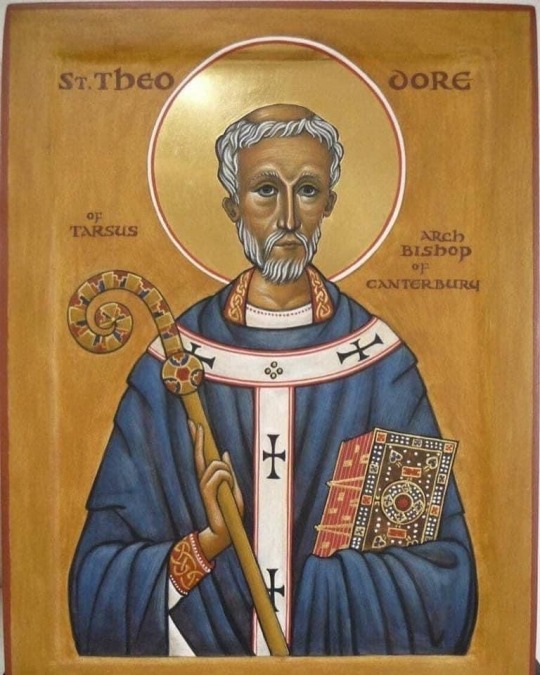
#christianity#saints#church#father troy beecham#troy beecham episcopal#father troy beecham episcopal
2 notes
·
View notes
Photo

Litany of the Saints and Blessed of the Society of Jesus
(in an expanded form of that used first by Jesuits in the concentration camp at Dachau)
Lord, have mercy, Lord, have mercy. Christ, have mercy, Christ, have mercy. Lord, have mercy, Lord, have mercy. Christ, hear us, Christ, graciously hear us.
God, our Father in heaven, Have mercy on us. God the Son, Redeemer of the World, Have mercy on us. God the Holy Spirit, Have mercy on us. Holy Trinity, one God, Have mercy on us.
Holy Mary, Mother of our Lord and Savior Jesus Christ, Pray for us. Holy Mary, Mother and Queen of our Society, Pray for us. Holy Virgin of Montserrat, Pray for us. Our Lady of the Way, Pray for us.
Holy Father Ignatius, Pray for us. St. Francis Xavier, first companion and missionary, Pray for us. St. Francis Borgia, model of renunciation, Pray for us. St. Stanislaus Kostka, model and patron of novices, Pray for us. Sts. Edmund Campion, Robert Southwell and companions, martyrs of Christ in England, Pray for us. St. Aloysius Gonzaga and St. John Berchmans, models and patrons of our scholastics, Pray for us. Sts. Paul Miki, James Kisai and John Soan de Goto, martyrs of Christ in Japan, Pray for us. St. Peter Canisius and St. Robert Bellarmine, doctors of the church, Pray for us. St. John Ogilvie, martyr of Christ in Scotland, Pray for us. Sts. Bernardine Realino, John Francis Regis and Francis Jerome, missioners to people in town and country, Pray for us. St. Alphonsus Rodriguez, model and patron of our brothers, Pray for us. Sts. Melchior Grodziecki and Stephen Pongrácz, martyrs of Christ in Košice, Pray for us. Sts. Roch Gonzalez, Alphonsus Rodriguez and John del Castillo, martyrs of Christ in Paraguay, Pray for us. Sts. John de Brébeuf, Isaac Jogues and companions, martyrs of Christ in North America, Pray for us. St. Peter Claver, defender of the slaves in South America, Pray for us. St. Andrew Bobola, martyr of Christ in Poland, Pray for us. St. John de Brito, martyr of Christ in India, Pray for us. St. Claude La Columbière, faithful friend and apostle of the Sacred Heart, Pray for us. St. Joseph Pignatelli, hallowed link of the old and the restored Society, Pray for us. Sts. Leo Mangin and companions, martyrs of Christ in China, Pray for us. St. Joseph Rubio, apostle of Madrid, Pray for us. St. Peter Faber, first companion and apostle of the Spiritual Exercises, Pray for us. St. Joseph de Anchieta, apostle of Brazil, Pray for us. St. James Berthieu, martyr of Christ in Madagascar, Pray for us. St. Alberto Hurtado, agent of social change in Chile, Pray for us.
All you Saints of the Society of Jesus, Pray for us. Blessed Ignatius de Azevedo and companions, martyred while sailing for Brazil, Pray for us. Bl. Thomas Woodhouse, Ralph Ashley and companions, martyrs of Christ in England, Pray for us. Bl. Rudolph Acquaviva, Francis Aranha and companions, martyrs of Christ in India, Pray for us. Bl. James Salès and William Saultemouche, martyrs of the Eucharist in France, Pray for us. Bl. Charles Spinola, Sebastian Kimura and companions, martyrs of Christ in Japan, Pray for us. Bl. Dominic Collins, martyr of Christ in Ireland, Pray for us. Bl. Diego Luis de San Vitores, martyr of Christ in Micronesia, Pray for us. Bl. Julian Maunoir and Anthony Baldinucci, zealous preachers of God’s Word, Pray for us. Bl. James Bonnaud and companions, martyrs of Christ in France, Pray for us. Bl. John Beyzym, servant of Lepers in Madagascar, Pray for us. Bl. Miguel Pro, martyr of Christ in Mexico, Pray for us. Bl. Francis Garate, humble doorkeeper who found God in all things, Pray for us. Bl. Rupert Mayer, apostle of Munich and fearless witness of truth, Pray for us. Bl. Tomás Sitjar Fortiá and companions, martyrs of Christ in Valencia, Pray for us.
All you Blessed of the Society of Jesus, Pray for us.
Jesuit saints
Fathers and Brothers, Scholastics and Novices of the Society who have preceded us in the service of the Lord, Pray for us.
Let us pray:
Father of our Lord and Savior Jesus Christ, though we are sinners, you have called us to be his companions and to engage in the crucial struggle of our time, the struggle for faith, justice and love. Bring to completion in us the work you began in Ignatius and so many of his followers. Place us with your Son, as you placed them, and take us under the banner of the Cross to serve him alone and his Church. We ask this through Christ our Lord. Amen.
11 notes
·
View notes
Text
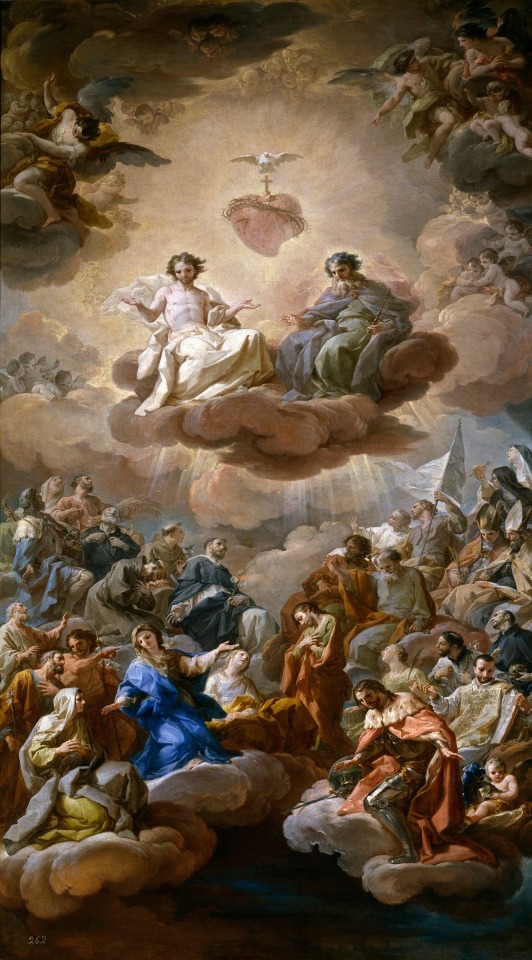
Litany of Saints
Lord, have mercy on us. Lord, have mercy on us.
Christ, have mercy on us. Christ, have mercy on us.
Lord, have mercy on us. Lord, have mercy on us.
Christ, hear us. Christ, graciously hear us.
God, the Father of heaven, have mercy on us.
God the Son, Redeemer of the world, have mercy on us.
God the Holy Spirit, have mercy on us.
Holy Trinity, one God, have mercy on us.
Holy Mary, pray for us.
Holy Mother of God, pray for us.
Holy Virgin of virgins, pray for us.
St. Michael, pray for us.
St. Gabriel, pray for us.
St. Raphael, pray for us.
All you Holy Angels and Archangels, pray for us.
St. John the Baptist, pray for us.
St. Joseph, pray for us.
All you Holy Patriarchs and Prophets, pray for us.
St. Peter, pray for us.
St. Paul, pray for us.
St. Andrew, pray for us.
St. James, pray for us.
St. John, pray for us.
St. Thomas, pray for us.
St. James, pray for us.
St. Philip, pray for us.
St. Bartholomew, pray for us.
St. Matthew, pray for us.
St. Simon, pray for us.
St. Jude, pray for us.
St. Matthias, pray for us.
St. Barnabas, pray for us.
St. Luke, pray for us.
St. Mark, pray for us.
All you holy Apostles and Evangelists, pray for us.
All you holy Disciples of the Lord, pray for us.
All you holy Innocents, pray for us.
St. Stephen, pray for us.
St. Lawrence, pray for us.
St. Vincent, pray for us.
Sts. Fabian and Sebastian, pray for us.
Sts. John and Paul, pray for us.
Sts. Cosmas and Damian, pray for us.
All you holy Martyrs, pray for us.
St. Sylvester, pray for us.
St. Gregory, pray for us.
St. Ambrose, pray for us.
St. Augustine, pray for us.
St. Jerome, pray for us.
St. Martin, pray for us.
St. Nicholas, pray for us.
All you holy Bishops and Confessors, pray for us.
All you holy Doctors, pray for us.
St. Anthony, pray for us.
St. Benedict, pray for us.
St. Bernard, pray for us.
St. Dominic, pray for us.
St. Francis, pray for us.
All you holy Priests and Levites, pray for us.
All you holy Monks and Hermits, pray for us.
St. Mary Magdalene, pray for us.
St. Agatha, pray for us.
St. Lucy, pray for us.
St. Agnes, pray for us.
St. Cecilia, pray for us.
St. Anastasia, pray for us.
St. Catherine, pray for us.
St. Clare, pray for us.
All you holy Virgins and Widows, pray for us.
All you holy Saints of God, pray for us.
Lord, be merciful, Lord, save your people.
From all evil, Lord, save your people.
From all sin, Lord, save your people.
From your wrath, Lord, save your people.
From a sudden and unprovided death, Lord, save your people.
From the snares of the devil, Lord, save your people.
From anger, hatred, and all ill-will, Lord, save your people.
From the spirit of uncleanness, Lord, save your people.
From lightning and tempest, Lord, save your people.
From the scourge of earthquake, Lord, save your people.
From plague, famine, and war, Lord, save your people.
From everlasting death, Lord, save your people.
By the mystery of your holy Incarnation, Lord, save your people.
By your Coming, Lord, save your people.
By your Birth, Lord, save your people.
By your Baptism and holy fasting, Lord, save your people.
By your Cross and Passion, Lord, save your people.
By your Death and Burial, Lord, save your people.
By your holy Resurrection, Lord, save your people.
By your wonderful Ascension, Lord, save your people.
By the coming of the Holy Spirit, Lord, save your people.
On the day of judgment, Lord, save your people.
Be merciful to us sinners, Lord, hear our prayer.
That you will spare us, Lord, hear our prayer.
That you will pardon us, Lord, hear our prayer.
That it may please you to bring us to true penance, Lord, hear our prayer.
Guide and protect your holy Church, Lord, hear our prayer.
Preserve in holy religion the Pope, and all those in holy Orders, Lord, hear our prayer.
Humble the enemies of holy Church, Lord, hear our prayer.
Give peace and unity to the whole Christian people, Lord, hear our prayer.
Bring back to the unity of the Church all those who are straying, and bring all unbelievers to the light of the Gospel, Lord, hear our prayer.
Strengthen and preserve us in your holy service, Lord, hear our prayer.
Raise our minds to desire the things of heaven, Lord, hear our prayer.
Reward all our benefactors with eternal blessings, Lord, hear our prayer.
Deliver our souls from eternal damnation, and the souls of our brethren, relatives, and benefactors, Lord, hear our prayer.
Give and preserve the fruits of the earth, Lord, hear our prayer.
Grant eternal rest to all the faithful departed, Lord, hear our prayer.
That it may please You to hear and heed us, Jesus, Son of the Living God, Lord, hear our prayer.
Lamb of God, who takes away the sins of the world, Spare is, O Lord!
Lamb of God, who takes away the sins of the world, Graciously hear us, O Lord!
Lamb of God, who takes away the sins of the world, Have mercy on us.
Christ, hear us, Christ, graciously hear us.
Lord Jesus, hear our prayer. Lord Jesus, hear our prayer.
Lord, have mercy on us. Lord, have mercy on us.
Christ, have mercy on us. Christ, have mercy on us.
Lord, have mercy on us. Lord, have mercy on us.
121 notes
·
View notes
Text
Rachel Stephens doesn’t understand polemics, part two, deconstructing the key Holidays.
Christmas
Originally called Christ’s Mass also called Feast of the Nativity of Jesus Christ, Noel, & Dies Natalis.
The claim that holds water is that it was based on a Norse holiday celebrating the winter solstice on Dec 22nd. As the Christian high holy day was moved over to occur near the winter solstice as a way of glossing over the seemingly universal and beloved holiday for most Gentiles Cultures which took place on Dec. 20th. Not the 25th.
The Christian version was 1st established before AD 200, and was originally celebrated on May 20th. It was a Liberian Church tradition that included a midnight mass, it was eventually moved to Dec 25th to confirm to a custom of the Church of Anastasia in Rome, a favorite church of Constantine, which is where the Mythicist will get their Mithras connection from even though the dating and location of the celebration doesn’t line up nor connect. But the Christian celebration quickly faded into the backdrop of normal liturgical feasts and solemnities no more prominent than say the Feast of Anastasia which is also held on Dec 25th, or the Memorial of St Clement which was the holiday on the day when I was researching this. It wasn’t until 1226, when a Devotion by St Assisi made the celebration and holiday popular again.
The Local customs for the feast are usually Christianized folk tradition of whichever community happens to be celebrating the Feast. And while these folk customs can derive from pre-Christian practices, as they are not mandated nor relegated by the church, they can be anything and derive from anything, you can make up a family tradition right now and it will be just as legitimate as a Christmas tree, drinking spiked eggnog, a reading of A Christmas Carol, or a recitation of the Night Before Christmas.
Easter
Interesting there is no Pagan nor Heathen holiday that actually lines up with Easter, the closest two are either the Spring Equinox on march 21ts and the Celtic Sumer Festival on April 30th. Though the two celebrations were not related to each other, in a round about way the forced connection makes sense, as the Spring Celebration was a planting feast; and the Summer Festival was a harvest feast. But again they were not practices by the same cultural nor did they celebrate the same pantheons.
Easter is actually a Liturgical Season called Lent and Eastertide that includes the Holidays of Ash Wednesday, Good Friday, and Trinity Sunday. The day itself, called colloquially Easter Sunday is an Obligation, but so is every Sunday if you really think about it. This vigil was originally an early Church Practice of the 1st century called an Illumination or a celebration of Lights; where a church would keep its candle lights on all night from midnight to early morning, commemorating the night Christ rose from the Dead.
Halloween
Originally called All Hallows Eve, it is the build up to All Saints Day on Nov 1st, and All Souls Day on Nov 2nd.
Said to be the Christianization of the Celtic, Gaelic, or Druid holiday of Samhain on Oct 31st. Which was the Celtic New Year’s Eve, on their Lunar calendar. But as the moon that signifies the Gaelic Lunar New Year would not be on a constant day and we have the Julian and Gregorian calendars this true fact does not hold as much weight as it proclaimers make it seem. Or I should say, it being a Gaelic New Year from pre-Roman times should have no more bearing on the coincidence than the Chinese New Year being on Feb 19th one year or Jan 29th some other year.
The Christian celebration of Halloween was initiated in AD 608 or 609, by Pope Boniface IV when he rededicated the Pantheon to the Blessed Virgin Mary and All Apostles latter changed to recognize all saints. Originally celebrated on May 13th. It was Pope Gregory III who in 837 changed the date of the observance to November the 1st, with the dedication of a chapel in the Vatican Basilica. But still the holiday wasn’t made popular among Catholic Christians until AD 998 when Abbot Odo of Cluny started making it a big deal. All saints day was originally a Greek Orthodox Feast but in a move of to show Ecumenical Unity it was added to the Latin Calendar as an act of solidarity. It is a commemoration of all the faithful departed, a rite in the church going back to the 1st Christians who held their Mass in Crypts and Necropoli. Sometimes saint names would be recited in litany’s of the mass.
While its Samhain connections are coincidental at best, its actual pagan connections stem from the Pantheon, a mega Temple dedicated to Athena/Minerva the Goddess of Wisdom and Patron goddess of Athens and Rome, and to the recognition of all the known Gods and Goddess built in the year 27 BC by Marcus Agrippa.
But that leave a question is the dates don’t really line up what are the dates of the Christan Holidays and what are those Holidays anyway. Jan 1st is the Solemnity of Mary Mother of God, Jan 6th is the Epiphany, Aug 1st is the Assumption/Dormition of the Blessed virgin Mary, Nov 1st is All Saints Day, Nov 2nd is All Souls day, Dec 8th is the Immaculate Conception of Mary, Dec 25th is the Nativity of our Lord Jesus Christ as two day holiday. And then there is Pentecost which is a moveable feast.
If we were going to have them fall on the four cardinal holidays of the pagan world we would need less holidays and we would have to include the Feast of John Baptist in the list of the major feast, which we don’t.
Other than Samhain, non of the pagan holidays line up. From Imblog to Yule, the dates, the practices, and the themes celebrated is not the same, and in fact their theology and morality are completely opposed to each other.
6 notes
·
View notes
Video
youtube
THE CHAINSMOKERS FT. KELSEA BALLERINI - THIS FEELING [4.09] There's been some confusion over genre-tagging here at Shiz...
Crystal Leww: The Chainsmokers want their own "The Middle," and Kelsea Ballerini proves to be a more than competent Maren Morris counterpart. I'm not-so-secretly thrilled; I thought Taylor Swift was going to be the blueprint for future country-pop popular success, but this is more immediate, more dumb, more in-your-face about its intentions and its style. Emily Warren yet again proves that she's one of the best songwriters in the game -- this has such a not-so-clever-but-thinks-it-is chorus -- and Ballerini and Taggart are excellent vocalists to bring it forth in an open-hearted and sweet way. EDM-pop is back to being dead, but its fighting for its last gasp has been loud and dumb and fun, just like it was in its prime. [8]
Anthony Easton: Trying for that FGL Bebe Rexha success, and the Chainsmokers are nearly as bad as FGL, but Kelsea has a delicate voice capable of a certain amount of emotional toughness. It's frustrating that her voice is much less interesting here than it has been anywhere else, but chase those dollars. [5]
Alfred Soto: From the strumming and chipmunk voices to singing as if watching a bouncing ball on a teleprompter, it's clear the Chainsmokers have invested not a cent of their hard-earned 2016 earnings into songwriting workshops. Kelsea Ballerini comes no closer than Halsey to embodying "this" "feeling." [4]
Thomas Inskeep: This feeling is hatred, provoked by hearing the one Chainsmoker singing like the douche-bro he so clearly is. [2]
Taylor Alatorre: The vibe the Chainsmokers constantly give off is that they're different from all those other EDM acts populating the Billboard charts -- they actually believe lyrics matter. Such a cloying mindset doesn't always lead to bad results, but it does when the Chainsmokers think they can whip up catharsis just by diagramming a situation that's vaguely emotional. It's unclear to whom this "story" is being addressed, with both Ballerini and Taggart too absorbed in meta-commentary to engage with one another or the real underlying issues. But we still get that big fireworks moment at the end, to justify all the build-up and to fool us into thinking some sort of breakthrough has occurred. If you're paying less attention than the Chainsmokers want you to, it almost works. [4]
Iain Mew: It's the old tale of head versus heart that Ellie Goulding reversed so fruitfully, with only the orphan addition of "hands at my neck" doing anything more with the theme (I refuse to count "nod their heads"). It would have been more entertaining if they'd gone for an entire litany of body parts, Darius on colours style, rather than just tacking a few onto a different well-worn line (the "I put it in this song" meta). It's the same story sonically, in that we're stranded between The Chainsmokers Drop (with leftover added Coldplay) and the staccato of "The Middle," and I'd rather be listening to either. [4]
Stephen Eisermann: What are these lyrics? Put aside the pretty standard "country"-EDM hybrid production for a second. We're promised a story and we get... a line? I kept waiting for a story, however cliche, a la "Eastside," but all we get was a statement. And even then, is it a statement? Is pivoting from I'll tell you a story to don't judge me, but I love him lol even a statement, or is it lazy writing? Kelsea sounds nice on pop production, though. [3]
Katherine St Asaph: The petulant spike to Warren's lyrics ("no one listens to me, so I put it in a song") combined with the pre-chorus and its closest thing to a guitar riff you can get away with in a 2018 pop single, makes me want this to turn into a Ballerini-fronted "Semi-Charmed Life" or "My Own Worst Enemy," which would rule (and where a chorus of nothing but "and I say yeah" would totally make sense). Instead we get two genres, both bad: a chorus of snippetized whatevers -- the convenient thing about 2018 EDM-pop is you can write one template and then vomit the sounds out in different patterns -- and limpid pop-country that averages both vocalists out for the worse. Ballerini's twang and sass are gone, and the Chainsmoker dude sings in a groggy, overprocessed low register: clearly trying to sound like a reputable, sensitive Dan + Shay type but not quite managing, like a frat guy smiling in a dean-friendly polo shirt for philanthropy day but still a little too hungover to pull it off. [4]
Joshua Copperman: Mr. Taggart, you are a young man who thinks in terms of hooks and drops. There are no hooks. There are no drops. There is no room for "heart vs head" debates. There is only one holistic algorithm of algorithms, one vast, interwoven, interacting, multi-variate, multi-national dominion of trap and adult contemporary infused with trap. Am I getting through to you, Mr. Taggart? You get up on your three-minute pop song with a country singer and pretend this isn't basically just "The Middle" via "Closer" and, I guess, "Winter Winds." There is no one listening to pop music. There is only abusive SoundCloud rap, Spotify-influenced pop, and some country filler here and there. You have meddled with the primal forces of 2018 pop music, Mr. Taggart. You won't need to atone because no one cares about you anyway. (It's a shame, because I actually kind of dig this.) [6]
Jacob Sujin Kuppermann: There's nothing left to write about The Chainsmokers and I think they realize that-- why else would they do a song that just sounds like their entire last album averaged out? [2]
Joshua Minsoo Kim: The best moment of "This Feeling" is when Kelsea Ballerini screams out "I say yeah-e-eh-eh" and the chorus swoops in to follow her lead. In deciding to follow her heart (er, "that thing in her chest"), it suddenly feels like the entire world is cheering her on and nothing else matters. And then Taggart's voice comes in and sounds comparatively dreadful. And then the second pre-chorus throws in a tacked-on kick drum to remove all tension. And then the bridge arrives to ruin everything beautiful about the song with a corny "my friends say nooo-e-oh-oh." And then the song ends. [3]
[Read, comment and vote on The Singles Jukebox ]
4 notes
·
View notes
Text
HISTORY OF SAINT JAMES’: THE BOOK OF COMMON PRAYER
01/14/2016
BY SJECWARRENTON
HISTORY OF SAINT JAMES’: THE BOOK OF COMMON PRAYER
THE BOOK OF COMMON PRAYER – ITS CONSTANCY AND ADAPTATIONS

Early in our 2016 Bicentennial observance, the liturgy at the main services will be from the 1789 1st American Book of Common Prayer, which was in use in 1816 when Saint James’ Church was established in Warrenton. Since then, there have been three revisions of the American Book of Common Prayer, the latest in 1979.
Early History
The first Book of Common Prayer was published in London on March 7, 1549. Thomas Cranmer (1489-1556), the first Protestant archbishop of Canterbury, put the English Bible in parish churches, drew up the Book of Common Prayer and composed a litany that remains in use today. Cranmer, and like-minded Reformers, insisted that in presenting Christ, obscure languages and rites (e.g., Latin) should not stand in the way of allowing people to “hear, read, mark, learn and inwardly digest” sacred truths. His commitment to English translations of the Bible made it accessible to people in a way it had never been before. Denounced for promoting Protestantism by the Catholic Queen Mary I, he was convicted of heresy and burned at the stake. Cranmer left a profound legacy that has come down through the ages.
Modern Times, and development of experimental liturgy in contemporary language
The American Book of Common Prayer has seen several revisions since its adoption from the Church of England’s prayer book – in 1892, 1928 and 1979 – and not without controversy; however, each revision has provided continuity with the past. Leading up to the 1979 edition now in use, parishes were introduced to proposed changes as early as 1971. At Saint James, a liturgy committee was formed by the Rector, the Rev. David Greer, to study the proposals. For the next 8 years, trial services were held, usually once a month, alternating Rite 1 with Rite 11. Meetings were held with representatives from Virginia Seminary and the church’s Liturgical Commission; questionnaires were sent to parishioners.
During Lent in 1976, the Piedmont region held a series of Eucharists utilizing ancient forms and more recent practice. After each service a priest gave a talk pertinent to the form of worship. The first service was held at Saint James’ in a “catacomb” church at the lowest level of the Education Wing – armed Roman soldiers patrolled Beckham and Culpeper Streets, a password had to be given at the lowest entrance to gain admission. Curtains were drawn; the only light was a candle on the Communion table. The service was brief: the words of institution given by our Lord; the communicants received morsels of homemade bread and wine.
The second service was held at Emmanuel Parish House, Middleburg, where stage sets depicted a 4th century basilica. As Emperor Constantine had made Christianity legitimate (A.D. 330), this service was much longer, with singing. The third service was at St. Peter’s Purcellville, using an early, mystical, liturgy. A sheer curtain separated priests and servers from clear view.
At Trinity, Washington, Va., the fourth service was in the form of an Anglo-Saxon Gallic liturgy as might have been held in a 10th century monastery – the choir dressed as monks and singing plain chant. The fifth service was at Trinity, Upperville (the “Cathedral” of the Region) for a High Mass of the late Middle Ages, according to the Sarum Rite. There were numerous clergy and servers, a sanctus bell, incense and pax board.
The sixth service was at Leeds, Markham, celebrating Communion such as might have been at colonial Jamestown, using the 1552 Prayer Book. A seventh service, held at St. Stephen’s Catlett employed the 1928 Prayer Book, with instruction. For the eighth and final service, a Folk Mass was held at St. James’, Leesburg, using the Great Thanksgiving from Rite II of the new Prayer Book (1979).
At the 1979 General Convention, the revised Prayer Book was adopted. In May 1980, the Vestry of Saint James’ Church voted to begin using the new Prayer Book at all services and to retire the 1928 Book.
– compiled by Richard Gookin, History Committee, January 2016
CATEGORIES HISTORY
TAGS 1928 BCP, 1979 BCP, BICENTENNIAL, BOOK OF COMMON PRAYER, CHURCH OF ENGLAND, HISTORY, HISTORY OF SAINT JAMES, THOMAS CRANMER
http://saintjameswarrenton.org/history-of-saint-james-the-book-of-common-prayer/
#1928 BCP#1979 BCP#Bicentennial#Book of Common Prayer#Church Of England#History#History of Saint James#Thomas Cranmer
0 notes
Text
Sébastien Michaëlis - Wikipedia
Michaëlis's classification
edit
In 1613 the Dominican prior and French inquisitor, Sébastien Michaëlis wrote a book, Admirable History, which included a classification of demons as it was told to him by the demon Berith when he was exorcising a nun, according to the author.[a] This classification is based on the Pseudo-Dionysian hierarchies, according to the sins the devil tempts one to commit, and includes the demons' adversaries (who suffered that temptation without falling).[19][22]
. The book contains a detailed hierarchy of devils named by the nuns; many of these demons (often having French names such as Rosier or Oeillet) do not appear in other demonologies, but the extent and systematic ordering of the list has led to its being widely adopted in esoteric circles.
First hierarchy
edit
The first hierarchy includes angels that were Seraphim, Cherubim, and Thrones:[19]
Beelzebub was a prince of the Seraphim, just below Lucifer. Beelzebub, along with Lucifer and Leviathan, were the first three angels to fall. He tempts men with pride and is opposed by St. Francis.
Leviathan was also a prince of the Seraphim who tempts people to give into heresy, and is opposed by St. Peter.
Asmodeus was also a prince of the Seraphim, burning with desire to tempt men into wantonness. He is opposed by St. John the Baptist.
Berith was a prince of the Cherubim. He tempts men to commit homicide, and to be quarrelsome, contentious, and blasphemous. He is opposed by St. Barnabas.
Astaroth was a prince of Thrones, who tempts men to be lazy and is opposed by St. Bartholomew.
Verrine was also a prince of Thrones, just below Astaroth. He tempts men with impatience and is opposed by St. Dominic.
Gressil was the third prince of Thrones, who tempts men with impurity and is opposed by St. Bernard.
Soneillon was the fourth prince of Thrones, who tempts men to hate and is opposed by St. Stephen.
Second hierarchy
edit
The second hierarchy includes Powers, Dominions, and Virtues:[19]
Carreau was a prince of Powers. He tempts men with hardness of heart and is opposed by St. Vincent.
Carnivale was also a prince of Powers. He tempts men to obscenity and shamelessness, and is opposed by John the Evangelist.
Oeillet was a prince of Dominions. He tempts men to break the vow of poverty and is opposed by St. Martin .
Rosier was the second in the order of Dominions. He tempts men against sexual purity and is opposed by St. Basil.
Belias was the prince of Virtues. He tempts men with arrogance and women to be vain, raise wanton children, and gossip during mass. He is opposed by St. Francis de Paul.
Third hierarchy
edit
The third hierarchy Principalities, Archangels, and Angels:[19]
Verrier was the prince of Principalities. He tempts men against the vow of obedience and is opposed by St. Bernard.
Olivier was the prince of the Archangels. He tempts men with cruelty and mercilessness toward the poor and is opposed by St. Lawrence, patron saint of the poor.[23]
Iuvart was the prince of Angels. At the time of Michaelis's writing, Iuvart was believed to have possessed a young novice nun of the Ursulines, Madeleine Demandols de La Palud, from whom it was exorcised.[24]
Many of the names and ranks of these demons appear in the Sabbath litanies of witches, according to Jules Garinet's Histoire de la magie en France, and Collin de Plancy's Dictionnaire Infernal.
FLEURDELISÈ
0 notes
Text
Litany of the Saints
Lord, have mercy on us. (Lord have mercy on us.)
Christ, have mercy on us. (Christ have mercy on us.)
Lord, have mercy on us. (Lord, have mercy on us.)
Christ, hear us. (Christ, hear us.)
Christ, graciously hear us. (Christ, graciously hear us.)
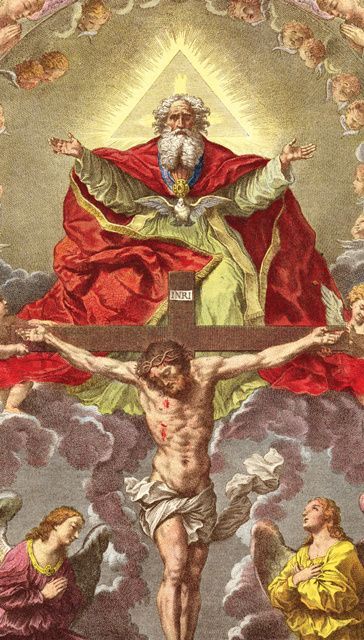
Source of picture: www.catholicprayercards.org
God the Father of heaven, (have mercy on us.)
God the Son, Redeemer of the world, (have mercy on us.)
God the Holy Ghost, (have mercy on us.)
Holy Trinity, one God, (have mercy on us.)
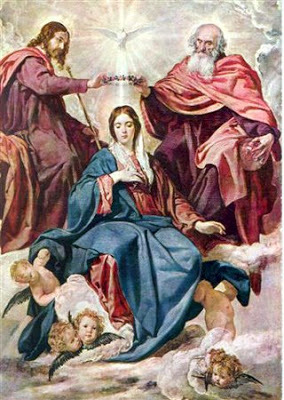
Diego Velazquez: Coronation of the Virgin
Holy Mary, (pray for us.)
Holy Mother of God, (pray for us.)
Holy Virgin of virgins, (pray for us.)
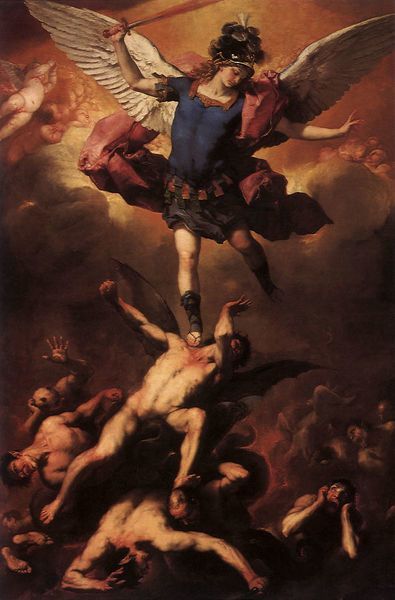
Luca Giordano: The Fall of the Rebel Angels
St. Michael, (pray for us.)
St. Gabriel, (pray for us.)
St. Raphael, (pray for us.)
All ye holy Angels and Archangels, (pray for us.)
All ye holy orders of blessed Spirits, (pray for us.)
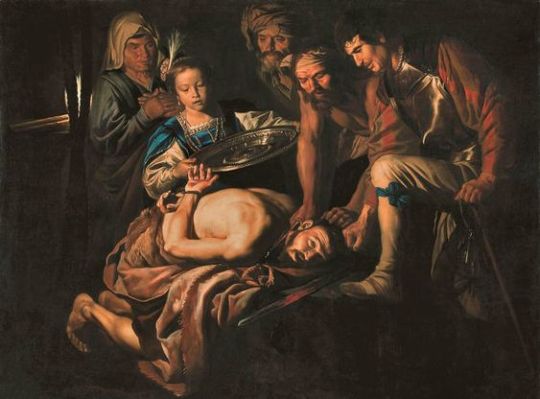
Matthias Stomer: The Beheading of Saint John the Baptist
St. John the Baptist, (pray for us.)
St. Joseph, (pray for us.)
All ye holy Patriarchs and Prophets, (pray for us.)
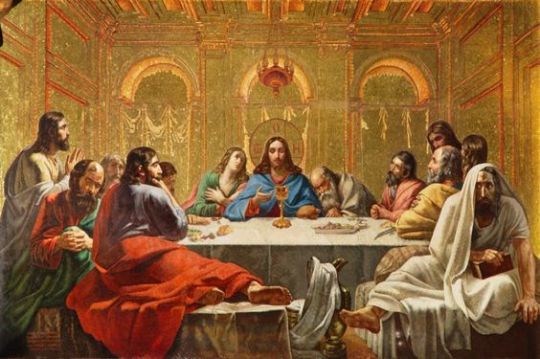
Mosaic of St. Isaacs Cathedral, St. Petersburg
St. Peter, (pray for us.)
St. Paul, (pray for us.)
St. Andrew, (pray for us.)
St. James, (pray for us.)
St. John, (pray for us.)
St. Thomas, (pray for us.)
St. James, (pray for us.)
St. Philip, (pray for us.)
St. Bartholomew, (pray for us.)
St. Matthew, (pray for us.)
St. Simon, (pray for us.)
St. Thaddeus, (pray for us.)
St. Matthias, (pray for us.)
St. Barnabas, (pray for us.)
St. Luke, (pray for us.)
St. Mark, (pray for us.)
All ye holy Apostles and Evangelists, (pray for us.)
All ye holy Disciples of the Lord, (pray for us.)
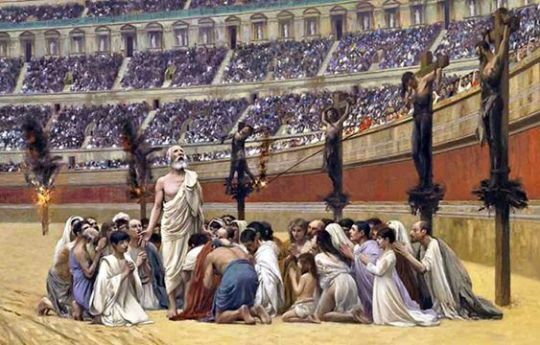
Source of picture: FAITH on Pinterest
All ye holy Innocents, (pray for us.)
St. Stephen, (pray for us.)
St. Lawrence, (pray for us.)
St. Vincent, (pray for us.)
SS. Fabian and Sebastian, (pray for us.)
SS. John and Paul, (pray for us.)
SS. Cosmas and Damian, (pray for us.)
SS. Gervase and Protase, (pray for us.)
All ye holy Martyrs, (pray for us.)
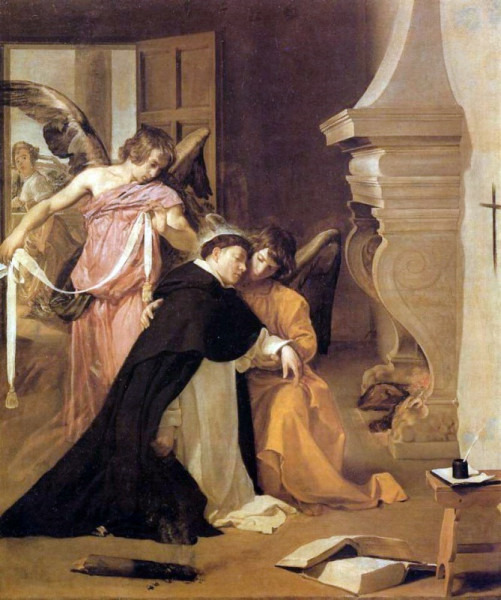
Diego Velazquez: St. Thomas Aquinas
St. Sylvester, (pray for us.)
St. Gregory, (pray for us.)
St. Ambrose, (pray for us.)
St. Augustine, (pray for us.)
St. Jerome, (pray for us.)
St. Martin, (pray for us.)
St. Nicholas, (pray for us.)
All ye holy Bishops and Confessors, (pray for us.)
All ye holy Doctors, (pray for us.)
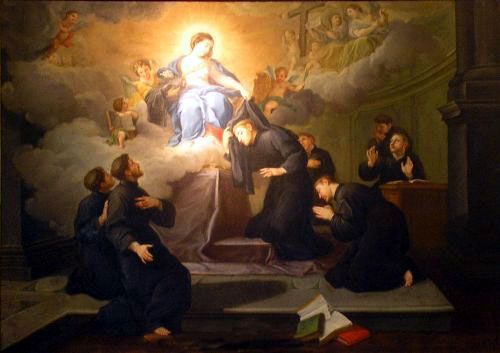
The Seven Holy Founders of the Servite Order, Source of picture: https://catholicharboroffaithandmorals.com
St. Anthony, (pray for us.)
St. Benedict, (pray for us.)
St. Bernard, (pray for us.)
St. Dominic, (pray for us.)
St. Francis, (pray for us.)
All ye holy Priests and Levites, (pray for us.)
All ye holy Monks and Hermits, (pray for us.)

Source of picture: www.flickr.com
St. Mary Magdalen, (pray for us.)
St. Agatha, (pray for us.)
St. Lucy, (pray for us.)
St. Agnes, (pray for us.)
St. Cecilia, (pray for us.)
St. Catherine, (pray for us.)
St. Anastasia, (pray for us.)
All ye holy Virgins and Widows, (pray for us.)
All ye holy Saints of God, (Make intercession for us.)
Be merciful, (Spare us, O Lord.)
Be merciful, (Graciously hear us, O Lord.)

Source of picture: Ada Hernandez on Pinterest
From all evil, O Lord, (deliver us.)
From all sin, (deliver us.)
From Thy wrath, (deliver us.)
From sudden and unlooked for death, (deliver us.)
From the snares of the devil, (deliver us.)
From anger, and hatred, and every evil will, (deliver us.)
From the spirit of fornication, (deliver us.)
From lightning and tempest, (deliver us.)
From the scourge of earthquakes, (deliver us.)
From plague, famine and war, (deliver us.)
From everlasting death, (deliver us.)
Through the mystery of Thy holy Incarnation, (deliver us.)
Through Thy Coming, (deliver us.)
Through Thy Birth, (deliver us.)
Through Thy Baptism and holy Fasting, (deliver us.)
Through Thy Cross and Passion, (deliver us.)
Through Thy Death and Burial, (deliver us.)
Through Thy holy Resurrection, (deliver us.)
Through Thine admirable Ascension, (deliver us.)
Through the coming of the Holy Ghost, the Paraclete, (deliver us.)
In the day of judgment, (deliver us.)
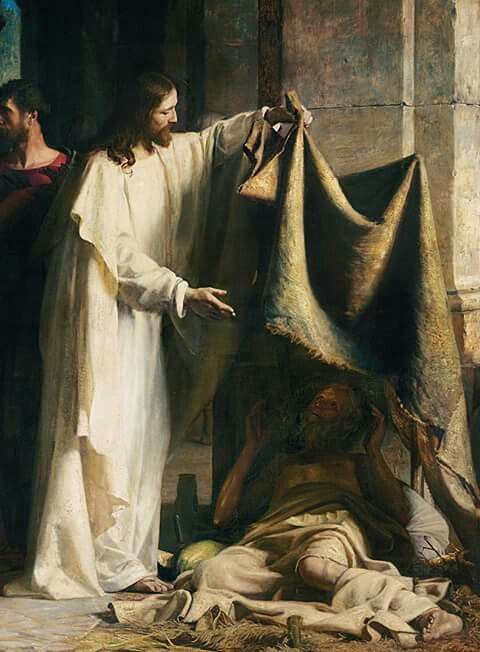
Source of picture: Gabriel Sierra on Pinterest
We sinners, (we beseech Thee, hear us.)
That Thou wouldst spare us, (we beseech Thee, hear us.)
That Thou wouldst pardon us, (we beseech Thee, hear us.)
That Thou wouldst bring us to true penance, (we beseech Thee, hear us.)
That Thou wouldst vouchsafe to govern and preserve Thy holy Church, (we beseech Thee, hear us.)
That Thou wouldst vouchsafe to preserve our Apostolic Prelate, and all orders of the Church in holy religion, (we beseech Thee, hear us.)
That Thou wouldst vouchsafe to humble the enemies of holy Church, (we beseech Thee, hear us.)
That Thou wouldst vouchsafe to give peace and true concord to Christian kings and princes, (we beseech Thee, hear us.)
That Thou wouldst vouchsafe to grant peace and unity to the whole Christian world, (we beseech Thee, hear us.)
That Thou wouldst call back to the unity of the Church all who have strayed from her fold, and to guide all unbelievers into the light of the Gospel
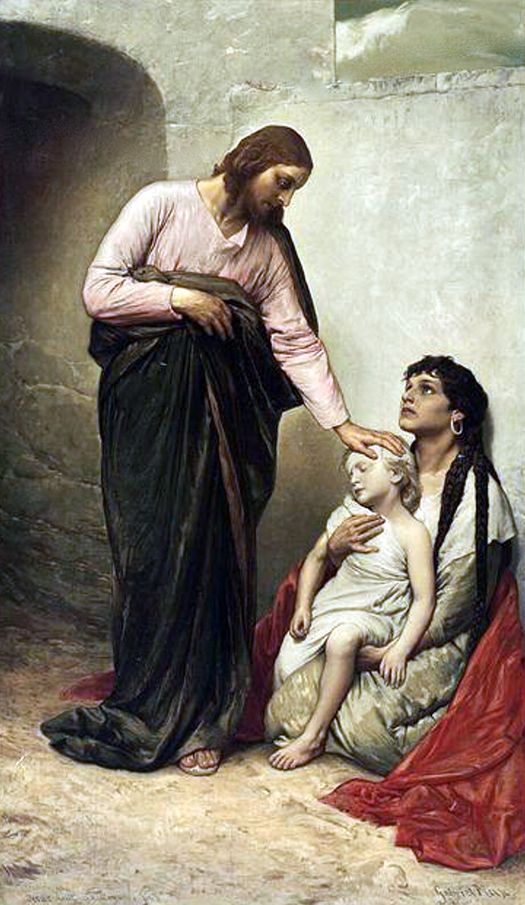
Gabriel Max: Jesus Healing the Sick
That Thou wouldst vouchsafe to confirm and preserve us in Thy holy service, (we beseech Thee, hear us.)
That Thou wouldst lift up our minds to heavenly desires, (we beseech Thee, hear us.)
That Thou wouldst render eternal blessings to all our benefactors, (we beseech Thee, hear us.)
That Thou wouldst deliver our souls, and the souls of our brethren, relations, and benefactors, from eternal damnation, (we beseech Thee, hear us.)
That Thou wouldst vouchsafe to give and preserve the fruits of the earth, (we beseech Thee, hear us.)
That Thou wouldst vouchsafe to grant eternal rest to all the faithful departed, (we beseech Thee, hear us.)
That Thou wouldst vouchsafe graciously to hear us, (we beseech Thee, hear us.)
Son of God, (we beseech Thee, hear us.)
Lamb of God, who take away the sins of the world, (spare us, O Lord.)
Lamb of God, who take away the sins of the world, (graciously hear us, O Lord.)
Lamb of God, who take away the sins of the world, (have mercy on us.)
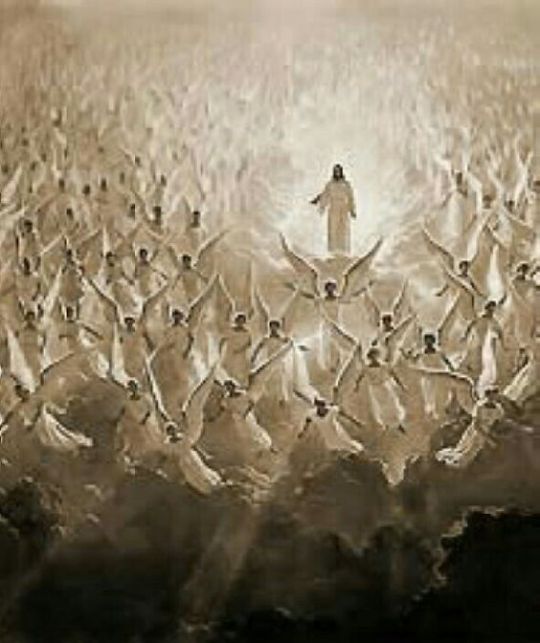
Source of picture: Jerry Walden on Pinterest
Christ, (hear us.)
Christ, (graciously hear us.)
Lord, have mercy, (Lord, have mercy.)
Christ, have mercy, (Christ, have mercy.)
Lord, have mercy, (Lord, have mercy.)
[Our Father inaudibly] And lead us not into temptation (but deliver us from evil.)
#Litany of the Saints#prayer#God#Christ#Jesus#Jesus Christ#Father#Son#Holy Spirit#Holy Trinity#christian religion#faith#hope#love#hear us#Our Father lead us not into temptation but deliver us from evil#Lamb of God#take away the sins of the world#vouchsafe to confirm us and preserve us in Thy holy service we beseech Thee#we sinners we beseech Thee#from all evil O Lord deliver us#all ye Holy Saints of God make intercession for us#pray#St. Anthony#St. Mary Magdalen#St. Sylvester#All ye Holy Innocents#St. Peter#St. John the Baptist#St. Michael
6 notes
·
View notes
Text
Happy all saints day!
Litany of the Saints
Lord, have mercy on us. (Lord have mercy on us)
Christ, have mercy on us. (Christ have mercy on us)
Lord, have mercy on us. (Lord, have mercy on us)
Christ, hear us. (Christ, hear us)
Christ, graciously hear us. (Christ, graciously hear us)
God the Father of heaven, (have mercy on us)
God the Son, Redeemer of the world, (have mercy on us)
God the Holy Spirit, (have mercy on us.)
Holy Trinity, one God, (have mercy on us)
Holy Mary, Holy Mother of God, (pray for us*)
Holy Virgin of virgins,
St. Michael,
St. Gabriel,
St. Raphael,
All you holy Angels and Archangels, all you holy orders of blessed Spirits.
St. John the Baptist,
St. Joseph,
All you holy Patriarchs and Prophets.
St. Peter,
St. Paul,
St. Andrew,
St. James,
St. John,
St. Thomas,
St. James,
St. Philip,
St. Bartholomew,
St. Matthew,
St. Simon,
St. Thaddeus,
St. Matthias,
St. Barnabas,
St. Luke,
St. Mark,
All you holy Apostles and Evangelists, all you holy Disciples of the Lord, all you holy Innocents.
St. Stephen,
St. Lawrence,
St. Vincent,
SS. Fabian and Sebastian,
SS. John and Paul,
SS. Cosmas and Damian,
SS. Gervase and Protase,
All you holy Martyrs.
St. Sylvester,
St. Gregory,
St. Ambrose,
St. Augustine,
St. Jerome,
St. Martin,
St. Nicholas,
All you holy Bishops and Confessors.
St. Anthony,
St. Benedict,
St. Bernard,
St. Dominic,
St. Francis,
All you holy Priests and Levites, all you holy Monks and Hermits.
St. Mary Magdalen,
St. Agatha,
St. Lucy,
St. Agnes,
St. Cecilia,
St. Catherine,
St. Anastasia,
St. Bernadette
All you holy Virgins and Widows, all you holy Saints of God, (make intercession for us.)
Be merciful, (spare us, O Lord.)
Be merciful, (graciously hear us, O Lord.)
From all evil, O Lord (deliver us*)
From all sin,
From Your wrath,
From sudden and unlooked for death,
From the snares of the devil,
From anger, and hatred, and every evil will,
From the spirit of fornication,
From lightning and tempest,
From the scourge of earthquakes,
From plague, famine and war,
From everlasting death,
Through the mystery of Your holy Incarnation,
Through Your Coming,
Through Your Birth,
Through Your Baptism and holy Fasting,
Through Your Cross and Passion,
Through Your Death and Burial,
Through Your holy Resurrection,
Through Your admirable Ascension,
Through the coming of the Holy Spirit, the Paraclete.
In the day of judgment.
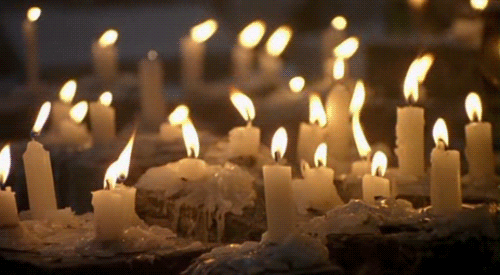
#catholic witch#catholic witchcraft#christian witch#christian witchcraft#christopagan#christopaganism
157 notes
·
View notes
Photo

Prayer For The Day
A prayer to St. Stephen
The Litany of St. Stephen
(For private recitation only)
Lord, have mercy on us
Christ, have mercy on us
Lord, have mercy on us,
Christ, hear us,
Christ, graciously hear us.
God, the Father of heaven, have mercy on us.
God, the Son, Redeemer of the world, have mercy on us.
God, the Holy Ghost, have mercy on us.
St. Stephen, first martyr,
pray for us. *
St. Stephen, who suffered for preaching the name of Jesus Christ,*
St. Stephen, who so closely imitated Jesus Christ in that great virtue of charity for your enemies,*
St. Stephen, who, when stoned by your enemies, cast forth sparks, not of anger, but of love, to set on fire their hearts, harder than the stones which they threw,*
St. Stephen, having recommended your own soul to God, cried for your enemies, Pardon them, O Lord, and punish them not for their sins,*
St. Stephen, most zealous for the glory of God,*
St. Stephen, most patient and constant,*
St. Stephen, pattern of chastity and purity,*
St. Stephen, whose heavenly fortitude caused admiration in all,*
St. Stephen, by whom so many miracles were wrought,*
St. Stephen, who, in the love of God, was not inferior to the Apostles themselves,*
St. Stephen, who converted many to the faith of Christ,*
St. Stephen, by whom the Church has received and does continually receive such singular benefits,*
St. Stephen, of whom it is said, that the Holy Ghost, Who inhabited your soul, shone and darted forth his rays into your body,*
St. Stephen, whose face shone like that of an angel,*
St. Stephen, an angel in chastity,*
St. Stephen, full of faith and of the Holy Ghost,*
St. Stephen, dear to the heart of Jesus,*
Let us pray:
O glorious saint, faithful imitator of Jesus Christ martyr in will and in reality, so full of charity, zeal, love, and purity, deign to intercede for us poor exiles; you who are so high in the favor of God, we do entreat you to procure for us a little spark of that divine love which animated your heart, that we too one day may have the happiness of seeing our God face to face.
Oh! obtain for us that virtue for which you were so eminent, and which in our holy vocation is particularly required–Charity. Amen.
***
Prayer to St. Stephen as your Patron Saint
Saint Stephen, whom I have chosen as my special patron, pray for me that I, too, may one day glorify the Blessed Trinity in heaven. Obtain for me your lively faith, that I may consider all persons, things, and events in the light of almighty God. Pray, that I may be generous in making sacrifices of temporal things to promote my eternal interests, as you so wisely did.
Set me on fire with a love for Jesus, that I may thirst for His sacraments and burn with zeal for the spread of His kingdom. By your powerful intercession, help me in the performance of my duties to God, myself and all the world.
Win for me the virtue of purity and a great confidence in the Blessed Virgin. Protect me this day, and every day of my life. Keep me from mortal sin. Obtain for me the grace of a happy death. Amen.
16 notes
·
View notes